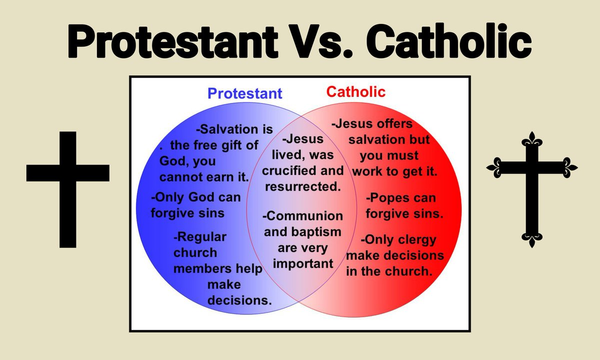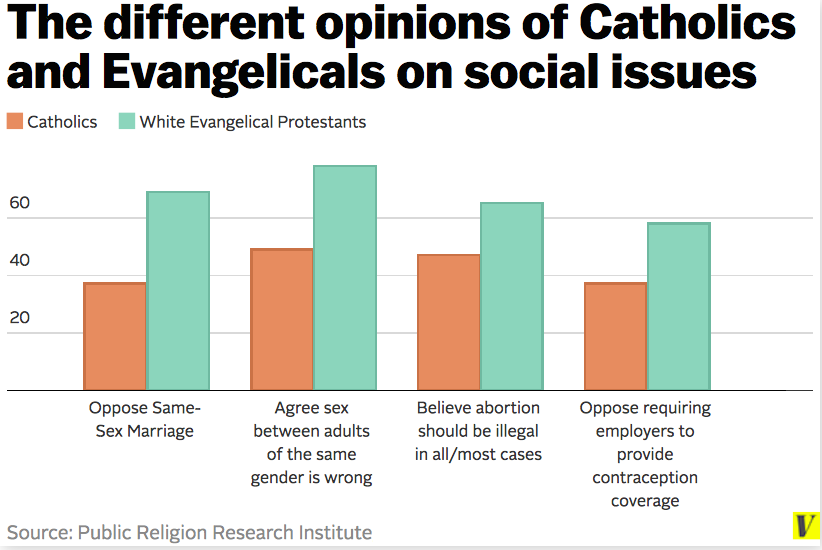Have you ever wondered about the seemingly vast gulf between Evangelicals and Catholics? They both claim to follow Christ, yet their practices, beliefs, and even how they understand their faith are often starkly different. This discrepancy sparks curiosity, sometimes confusion, and even a touch of tension. But is this a simple case of two sides of the same coin, or is there a deeper understanding to be reached?

Image: www.clker.com
This article dives into the intricacies of Evangelical and Catholic Christianity, exploring their historical roots, core beliefs, and how their differences impact their perception of faith, Scripture, and the world around them. Understanding these two major branches of Christianity can shed light on the diverse world of religion, help us bridge divides, and ultimately foster a deeper appreciation for the richness inherent in human faith.
Origins and Historical Context
Protestant Reformation and the Rise of Evangelicalism
To understand the differences between Evangelicals and Catholics, we need to understand their history. The Catholic Church reigned supreme in Western Europe for centuries until the 16th-century Protestant Reformation, a period of immense religious upheaval. Martin Luther, a German monk, challenged the authority of the Pope and the Church’s teachings, sparking a movement that led to the establishment of various Protestant denominations.
While there are countless Protestant branches, the term “Evangelical” first emerged in the 18th century with the First Great Awakening in the United States. It was a period of intense religious revivalism that emphasized personal conversion, Bible-centered faith, and missionary work. Key figures like Jonathan Edwards and George Whitefield spearheaded this movement, laying the foundation for modern Evangelicalism.
The Catholic Church: A Long and Enduring Tradition
While the Protestant Reformation led to the diversification of Christian faiths, the Catholic Church maintained its established structure, doctrines, and hierarchy. The Catholic tradition emphasizes the teachings of the Church Fathers, the authority of the Pope, and the importance of sacraments and rituals passed down through generations. This emphasis on tradition and hierarchical structure distinguishes Catholicism from other Christian denominations, including Evangelicalism.

Image: vox.com
Core Beliefs: Where Evangelicals and Catholics Agree and Disagree
The Bible: A Source of Authority
Both Evangelicals and Catholics consider the Bible as the word of God, but their interpretations and approaches differ.
Evangelical Perspective: Evangelicals generally believe in a literal interpretation of the Bible, taking its words as the direct, infallible word of God. They place a strong emphasis on individual scriptural interpretation, believing that every person can understand and directly apply biblical teachings to their own lives.
Catholic Perspective: While Catholics also hold the Bible as sacred, their interpretations are shaped by centuries of Church tradition and the teachings of the Church Fathers. The Catholic Church emphasizes the importance of interpreting scripture within the context of the Church’s official teachings and the guidance of its hierarchy.
Salvation and Justification: Different Paths to God?
Another major point of difference lies in understanding salvation and justification.
Evangelical Perspective: Evangelicals generally believe in salvation through faith alone, emphasizing personal conversion and an acceptance of Jesus Christ as Lord and Savior. They believe this acceptance results in being “saved” from eternal damnation and granted entrance into God’s Kingdom.
Catholic Perspective: Catholics believe in justification through faith and good works. While acknowledging the importance of faith in Christ, Catholics also emphasize the role of good deeds, participation in the sacraments, and following the teachings of the Church as essential paths to becoming righteous and achieving salvation.
The Role of the Church and Authority
The structure and authority within the church also presents a point of divergence.
Evangelical Perspective: Evangelicals typically emphasize the importance of local churches and the autonomy of individual churches. There is no single central authority, and each church is free to operate independently, determining its own doctrines and practices.
Catholic Perspective: Catholics are united under the leadership of the Pope and the centralized authority of the Catholic Church. The Pope is considered the successor to St. Peter, the first apostle, and holds the highest authority, guiding the Church’s teachings and doctrines. Catholicism emphasizes the importance of sacraments, which are administered by ordained priests and bishops, representing a hierarchical structure and spiritual authority.
Social Issues and Moral Values
The differences in beliefs and interpretations significantly influence how Evangelicals and Catholics approach social issues.
Evangelical Perspective: Evangelicalism has a strong emphasis on biblical morality and tends to be more conservative on social issues such as abortion, same-sex marriage, and euthanasia. This stance stems from the belief that the Bible provides direct guidance on these matters, and therefore should be followed in every aspect of life.
Catholic Perspective: While generally holding conservative views, the Catholic Church embraces a more nuanced understanding of social issues. There are strong positions against abortion and euthanasia, rooted in Catholic teachings on the sanctity of life. However, issues like same-sex marriage and the role of women in society are more complex, with a greater emphasis on compassion and understanding.
The Future of Evangelicals and Catholics: Coexistence and Dialogue
Despite their differences, Evangelicals and Catholics share a common belief in Jesus Christ and his teachings. Even with differing interpretations, there remains vast ground for dialogue, understanding, and collaboration.
Some key efforts to foster mutual understanding and collaboration include:
- Interfaith dialogue groups: These forums provide a space for open discussion and exchange of ideas, fostering communication and building bridges between these communities.
- Joint humanitarian initiatives: Evangelicals and Catholics are actively involved in addressing social issues, leading to collaborations in areas like poverty alleviation, disaster relief, and promoting peace and justice.
- Shared values and goals: Both groups emphasize the importance of love, compassion, and service, resulting in common goals like fostering a more just and compassionate world.
While significant differences remain, the future holds the potential for a more harmonious coexistence through understanding, dialogue, and collaborative efforts. Recognizing the shared foundations and values can pave the way for a deeper understanding and a more cooperative future for these two branches of Christianity.
Evangelicals Vs Catholics
Conclusion
The differences between Evangelicals and Catholics are undeniably significant, shaping their understanding of faith, their approach to scripture, and their stances on social issues. However, despite these distinctions, both communities have a strong foundation in Christ’s teachings and a dedication to serving others. Recognizing these shared values is crucial in fostering a more respectful and productive dialogue between these two branches of Christianity. This understanding allows us to move beyond simplistic labels and discover the richness and complexity inherent in the human experience of faith. Perhaps, through open communication and a commitment to shared values, a brighter future for collaboration and unity can be realized.






